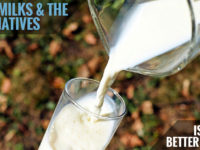This is a quick rebuttal to the article published last week in Vox by Mark Schatzker entitled “Study: diet soda can really mess with your metabolism“. In the article, Schatzker details a study in which a group of scientists created an array of beverages that ranged in sweetness and carbohydrate content (by using sucralose and maltodextrin). Some drinks tasted as sweet as a 150-calorie beverage but had zero calories, some tasted like they had no calories but had 150, and a few were in the middle. The results: lower-calorie sweet beverages induce a greater metabolic response than higher-calorie equally sweet beverages.
This isn’t the expected result, which would be a linear metabolic response according to the carbohydrate load of the beverage. It’s also not as surprising as the scientists make it sound in the original paper, as we know that the taste of a food (in particular sweet tastes) can drive a small metabolic response. In any case, it adds a bit more to our knowledge of how artificial sweeteners interact with our metabolism, but it does not—as Schatzker says—show that artificial sweeteners “really mess with your metabolism”.
The specific error Schatzker makes is implying that any storage of energy is bad and by itself leads to weight gain and metabolic dysfunction. Based on the results of the study, a small amount of carbohydrates that would normally have been used as energy immediately instead go “missing”—most likely stored in the muscle, liver, or fat. This is “bad”, and apparently explains why metabolic dysfunction is associated with diets high in processed foods. Except that storing calories instead of using them right away doesn’t actually put someone into a caloric excess, and that absent that caloric excess it’s rare that we find metabolic dysfunction.
Consider this: If you consume 150 calories worth of carbs and store 15 of them instead of using them because of an erroneous metabolic response, but you also consume an appropriate amount of calories for your needs during that day, then those 15 calories are going to be pulled right back out later on when your body needs them. This is, in fact, what happens most of the time when we consume fat—we initially store it and use previously stored fat as our fuel. Our storage tank isn’t bad by default, and putting calories into it isn’t a sign of “metabolic dysfunction”, it’s just the way our body works. The metabolic dysfunction referred to in the article isn’t a result of the brief storage of small amounts of energy, it’s the result of excess storage over a long period of time, which eventually leads to serious metabolic consequences; it’s predominantly a consequence of obesity, especially when the obesity is central (visceral fat, AKA “belly fat”).
There is certainly an argument against artificial sweeteners in the sense of training your perception and preference for sweet foods. If you only consume sweetened drinks, you may be more likely to prefer the sweetened taste and therefore to consume more sweetened foods in the future. It’s unlikely that the mildly off metabolic response to those foods is going to harm you itself, however.
Really, though, I think the authors’ conclusion in the paper is argument enough to dispel the idea that artificial sweeteners lead to long-term metabolic dysfunction. When considering why the disconnect [between caloric load, sweetness, and metabolic response] is present, they discuss how both sweetness and caloric load determine our metabolic response. Sweetness, they argue, is a good way for our body to predict what type of response is necessary when presented with a new food (like a fruit you’ve never tasted before). Caloric load and “taste preference” (based on repeat experience with a food), on the other hand, eventually drive long-term metabolic response. With this in mind, the scientists “predict[ed] that overtime, learning will occur as the flavor becomes a better predictor of the overall nutritional properties.”
In other words, the metabolic disconnect witnessed in the paper is a transient response to a new food that the scientists predict will go away with continued experience—certainly not a smoking gun for the metabolic danger of artificial sweeteners!












